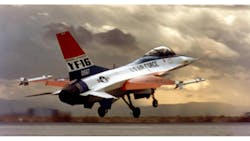Lockheed Martin Offers to Build F-16 Jets in India in Modi Push
Lockheed Martin Corp. (IW 500/30) has offered to build its flagship F-16 fighter jet in India, as the South Asian nation scrambles to modernize its aging defense fleet while trying to establish the country as a manufacturing base.
Lockheed Chairman, CEO Marillyn Hewson made the offer to Indian Prime Minister Narendra Modi in September, Phil Shaw, CEO of Lockheed’s Indian unit, said in an interview on February 18 at the Singapore Airshow. The U.S. and Indian governments are negotiating the deal, he said.
Modi needs to quickly replace many of the air force’s 650 planes -- a third of which are more than 40 years old -- and has vowed to turn India from the world’s biggest weapons importer into a global hub for defense manufacturing. The country sold about $150 million of arms in the last fiscal year, a fraction of the $64 billion in worldwide defense trade and its own arms imports of $5.6 billion.
"The U.S.-Indian relationship that has been developing could benefit Lockheed," Jon Grevatt, Asia-Pacific defense- industry analyst for IHS Jane’s, said by phone from Singapore. But, he added, "I don’t see it happening immediately. This is still very early stages."
Locally Made
After coming to power in May 2014 with the country’s biggest election mandate in three decades, Modi unveiled his ‘‘Make in India’’ campaign to boost manufacturing to 25% of gross domestic product by 2022 from 18% now.
The cornerstone of the policy is attracting companies to set up factories in India for manufacturing.
India picked Paris-based Dassault Aviation SA in 2012 to build 126 warplanes at an estimated cost of about $11 billion -- at the time the world’s biggest fighter-jet deal, and one in which Lockheed lost out. As talks stalled over price and quality guarantees, Modi flew to France last April and sought to directly buy 36 fighter jets from the French government in a bid to speed things up.
Lockheed understands the preferred option on such strategic purchases is a government-to-government discussion, Shaw said. He declined to say whether he thought India had erred by going for an auction process in the first round of the fighter jet deal that Dassault won. India first sought bids for new fighter jets in 2007.
Lobbying Process
Lockheed Martin is "anxious" to know the Indian Air Force’s requirements, which will help determine how many jets the country seeks to buy, Randall Howard, head of F-16 business development at Lockheed, said in the same interview.
"The problem we see is that India hasn’t come clean and said what its requirements are, in terms of both number of planes and their technical requirements," IHS Jane’s Grevatt said. "Until a requirement is made clear in either a tender or request for proposals, there seems to be a lobbying process going on."
Last week India summoned the U.S. ambassador in New Delhi to convey its displeasure at the planned sale of eight F-16 fighter jets to Pakistan, its nuclear-armed neighbor and biggest strategic rival. Howard called the proposed sale a government decision.
Shaw said Lockheed is in talks with Indian companies, including its existing Indian partner Tata Group, to find a potential partner for the fighter-jet program if it wins the contract. Phone calls seeking comment from Tata Group or Tata Advanced Systems Ltd., the group’s defense unit, were unsuccessful.
Indian Defense Ministry spokesman Nitin Wakankar didn’t immediately respond to a phone call seeking comment.
About the Author
Bloomberg
Licensed content from Bloomberg, copyright 2016.
